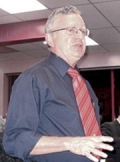
Sheri Shefa, Staff Reporter, Thursday, January 26, 2012
TORONTO Technion professor emeritus Shlomo Maital was in Toronto last week to share inspirational success stories about Israel’s technology institute.
The Canadian Technion Society (CTS), which raises funds and awareness for Haifa’s Technion Israel Institute of Technology, organized a dinner in honour of the new Generation Next project, an initiative to attract the 25-to-45 crowd to become involved with the organization.
The event, held at Dr. Laffa restaurant in North York and led by CTS national development director Hershel Recht, Generation Next chair Jack Bensimon, and CTS president Eddie Pal, brought together about 25 young professionals who represent the future of the organization.
Technion’s Maital, an author, researcher and educator who also taught at Massachusetts Institute of Technology (MIT) for 20 years, began his lecture by referencing a study that documented MIT’s contribution to the U.S. economy.
It showed that 26,000 businesses were started by MIT grads and if you put their GDP, their product, their value together, it would be an economy that would be the 11th largest in the world. I wondered about the Technion, said Maital, who has served in Israel’s economic ministry and is about to release a book he co-authored with Technion professor Amnon Frenkel called Technion Nation: Technion’s Contribution to Israel and to Humanity.
He said that it cost about $1 billion to educate the 2010 undergraduate class, but their contribution to Israel’s economy is expected to be an estimated $1.76 billion to nearly $3 billion a year.
However, Maital stressed, the success of Technion graduates shouldn’t be documented using statistics, facts and figures alone.
The book, scheduled for release in June, will also present stories about the contributions Technion graduates have made to Israeli society and the rest of the world.
Maital referred to 2004 Nobel Prize winners and Technion professors Avram Hershko and Aaron Ciechanover, who, along with American scientist Irwin Rose, discovered ubiquitin, a protein that causes cells to turn off and die.
Everyone in biology was studying how cells live and divide. Hershko thought it would be great to study how cells died, Maital said.
Everyone told him, That’s a graveyard for your career. Nobody cares how and why cells die. It turns out when cells don’t die, they become something called cancer.
Maital said that based on these findings, a pharmaceutical company developed a drug that kills cells before they can develop into cancer cells.
Maital added that one of Hershk’s friends has benefited from his scientific work. When his friend was diagnosed with stage-three myeloma, a bone marrow cancer that gave him about five years to live the drug that was produced based on Hershko’s discovery worked to slow down the development of the cancer, adding years to his life.
Another inspirational story Maital shared highlighted the work of Technion electrical engineering graduate Amit Goffer, who was involved in an accident that left him unable to walk and confined to a wheelchair.
Instead of being resigned to his fate as a quadriplegic, He asked, How can you take people who cannot move their legs and put them on their feet and enable them to walk? That’s a question with a lot of chutzpah, even to ask the question, Maital said.
Goffer designed a prototype he called an exoskeleton, a mechanical device that a person wears on his legs.
When a person leans forward, the computer senses that and moves the leg, and then the other leg.
The technology is called ReWalk, and it enables people with lower-limb disabilities to stand, walk, and even climb stairs.
The device is being used now in veterans hospitals in the U.S. to help soldiers who’ve been wounded and crippled by war to walk. And you can imagine what that feels like for a 21-year-old ex-marine who is in a wheelchair, to be able to stand up and walk, he said.
Maital, who said he was asked to keep his talk brief, stopped himself from sharing many more awe-inspiring stories that showcase Technion’s positive contribution to the world. But he encouraged the gathering to learn more about the technology institute and help the next generation of Technion students turn their ideas into something tangible.
The thing about the Technion is that the scientists who have made these discoveries, mostly are not satisfied with writing academic papers. They like to implement their ideas.

